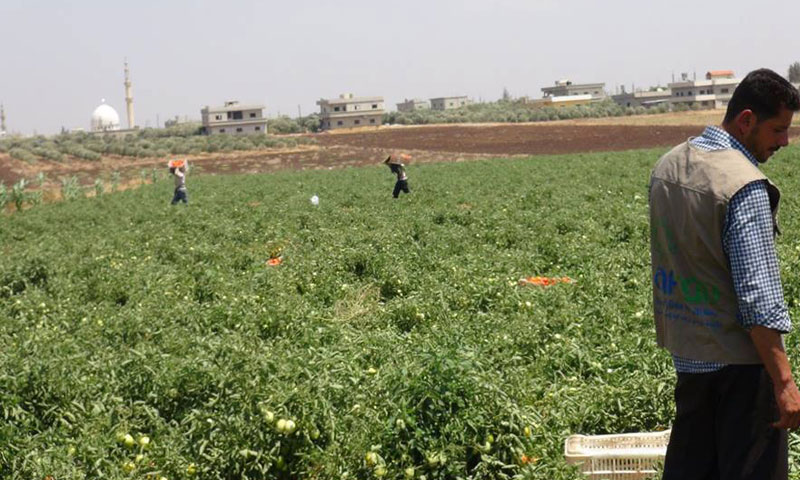
Syria: Agricultural Land Under Regime Control being Cultivated after their Owners are Displaced

Most of the regime-held areas in Deraa lack agricultural infrastructure and rely almost entirely on produce from ‘liberated’ areas. Over the past few years, opposition forces have been able to tighten their control over the countryside of Hauran, which constitutes the food basket of the southern region of Syria and the capital Damascus. Thus, the regime has control over key regions with high population density and limited food resources.
An unofficial policy by the regime in Deraa has caused surprise and fear among the local population. The regime has decided to start investing in the agricultural lands under its control, a move considered by some observers as an attempt to overcome the domination by ‘liberated’ areas of the food supply to regime-held areas. Others see it as a new attempt by the regime to impose a new demographic reality in Deraa through controlling and investing in agricultural land without considering the rights of the original owners.
Using Land without Knowledge of its Owners
Although the farmable geographical areas expected to be covered by the policy are very limited compared to those of the ‘liberated’ areas, this decision in itself constitutes a new and unexpected move at this time. It reinforces the impression that the regime is dealing with those who emigrate or who are part of the opposition as if they are non-existent and that their properties have no owners.
Enab Belaadi surveyed some agricultural lands owners who live in ‘liberated’ areas and whose lands are controlled by the regime. Most of the owners considered this move an extension of the divisions imposed by the presence of the various fighting groups in Daraa.
“Up until two years after the beginning of the revolution, I was able to farm my land with no problems but when the region turned into a flashpoint of intense clashes, landmines became widespread. I became unable to cultivate my land” Said Abu Qassem Al-Nasser, the owner of one of the agricultural lands in the vicinity of Jedya in Deraa’s northern countryside. He added that he was informed, by one of his close friends, that agricultural activity was taking place on his land, “I knew that my land was in a military zone. That is why it was a big surprise when I found out that there are people working my land”.
Concerning those cultivating his land, Abu Qassem said, “My friend and I found out, after reaching out to one of the workers on the land, that the work is being conducted by the Department of Agriculture, which is part of the regime. Then I learnt that a decision has been issued to cultivate all uncultivated lands so that the produce can be used by the regime”. Abu Qassem also expressed his inability to do anything right now, “I hope we can liberate my land and all of Deraa so that each person can get what is their right”, he added.
A Move that Could Help the Regime Dispose of the “Liberator”
Agricultural engineer, Abu Yaman Al Musalima, dismissed the idea that the regime could produce enough to allow it to no longer rely on production by ‘liberated’ areas, but he warned that this move could be a prelude for something bigger. “The countryside of Deraa has the necessary means when it comes to agriculture, animals and labor, unlike regime-held areas”, he said.
However, according to Abu Yaman, this move is very important. “Regime attempts to achieve agricultural autonomy from liberated areas, as well as previous attempts to achieve water self-sufficiency through bringing in water from the wells of Khirbet Ghazaleh towards Deraa, mean that the regime is preparing for something bigger”. Connecting this move and the military moves of the regime in Daraa’s central countryside, Abu Yaman said, “the regime is trying to impose its control on Dael and Abtaa. It is also probably trying to advance towards Tafas, which is the most important town in Hauran in agricultural terms”.
The agricultural engineer also noted that this move is not the only one, as the Department of Agriculture in Deraa, in collaboration with a Danish entity, is currently organizing agriculture courses for citizens in order to train people in regime-held areas and provide them with the necessary equipment. “Certainly, the move towards investing in agricultural lands is a complement to the training. It seems that we are facing a comprehensive strategy by the regime to restore agricultural control”, he added.
Abu Yaman warned the opposition groups in Deraa and more specifically, the armed factions, of the consequences of the regime’s attempts to end its dependence on produce from opposition areas, saying, “the regime may not stop at dispensing with produce from the liberated areas, but may also extend to restricting their production and imposing tough decisions on them”.
The armed opposition’s control over most of the rural areas in Syria’s provinces has dealt a major economic blow to the regime, whose impact has gradually emerged over time. Thus, the strategic zones in Syria are now divided between the opposition that controls key resources and the regime whose areas lack these resources. It seems that the regime’s new military strategy and the moves taken as part of this approach are aimed at asserting or regaining control over important economic resources in order to revive the economy and weaken the opposition economy at the same time. Does the opposition have any counterstrategy?
if you think the article contain wrong information or you have additional details Send Correction
النسخة العربية من المقال
-
Follow us :

















 A
A
A
A
A
A



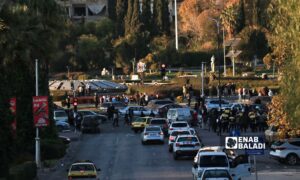
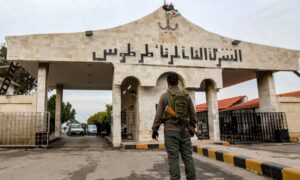
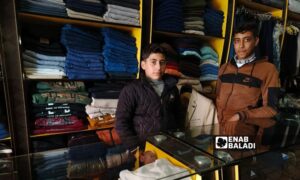
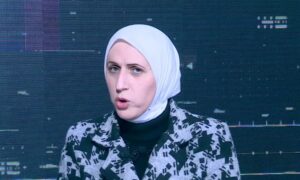
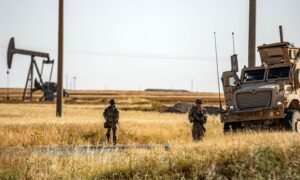
 More Economy
More Economy